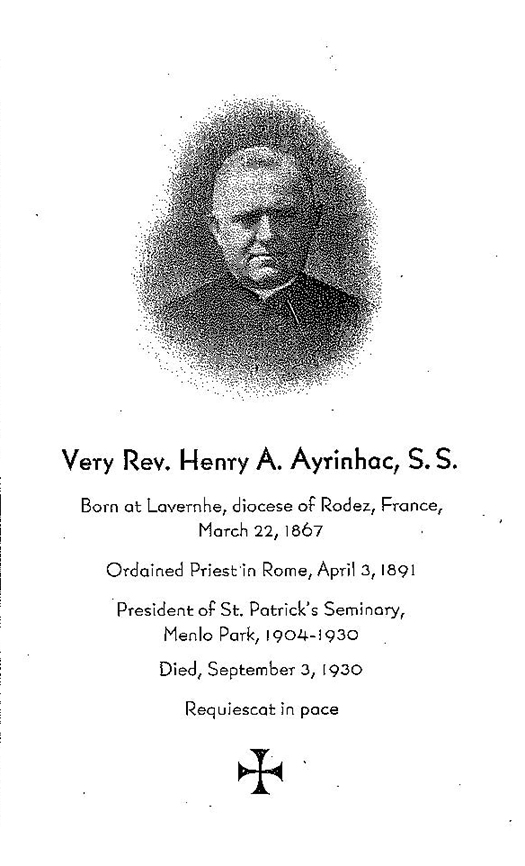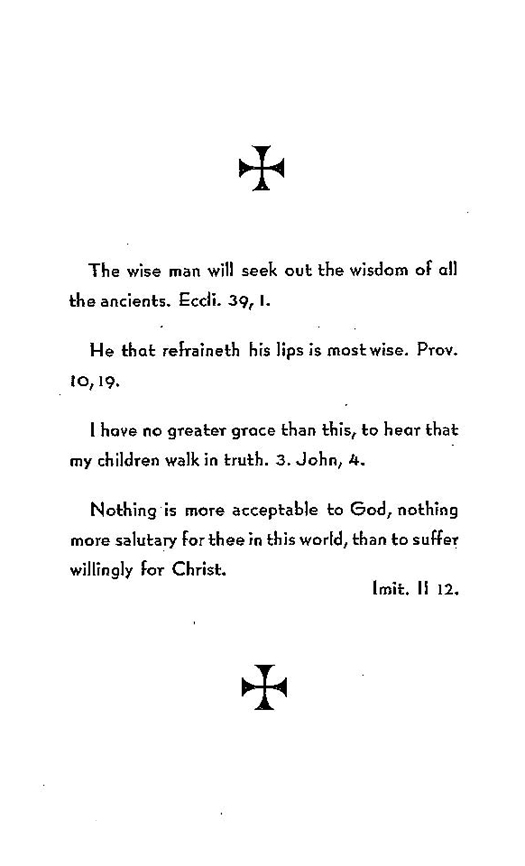Ayrinhac, Father Henry
1930, September 3
Date of Birth: 1867, March 21
Issy
October 28, 1930
Fathers and Dear Confreres:
Our province in the United States and the entire Society were dumbstruck when from San Francisco came the news of Father Ayrinhac’s death. In America, and more particularly in the dioceses of the West, the episcopacy paid tribute to the exceptional worth of Menlo Park’s Superior. The clergy hastened to express its gratitude for what this molder of priests did so prudently and so effectively. And the Catholic press published the account of his labors along with his attractive picture.
I want, in my turn, to go over the life of our dear deceased, and delicately unwrap the veil of humility and effacement in which he deliberately hid himself.
Henri Joseph Ayrinhac was born on March 21, 1867, in St. Grégoire in the Diocese of Rodez. His family was and is very religious. Several of his aunts were nuns. Some of their nieces followed in their footsteps. And one of our confrere’s nephews is at present pastor in his home diocese. No wonder that Henri Ayrinhac from childhood thought of the priesthood and almost naturally came to the altar.
At the minor seminary of St. Geniez d’Olt, where he began his studies aimed at priesthood, our future confrere had no difficulty in leading his class right from the start. His very lively intelligence, his steady work, his very simple but very deep piety, his striking modesty, won for him very quickly the esteem and affection of his fellow-students.
In October, 1885, Henri Ayrinhac entered the seminary of Philosophy at Rodez. His class contained 101 students.
In the first examination, Father Ayrinhac was at the head of the first four in his class ranked as disputants. The other three (who today hold high places in the diocese or in religious orders) contested each other for second place and one after another took him on. But they never could wrest first place from him.
At that time, Father Ayrinhac “for philosophical and theological questions had an understanding and a clarity of mind,” wrote one of his friends, “not met with in anyone else to such a degree! And with it he had a simplicity, an admirable modesty, and the attitude of a seminarian perfect in charity and reliability.”
These qualities did not fill him with the pushiness somewhat excusable in one of his age, nor with deviousness of mind. Still remembered are some of his quick responses. Never having hesitated about his vocation – for he took to seminary discipline and study from the start – Fahter Ayrinhac was, however, one of the last to don the cassock. The “eager beavers” pestered the tailors to hurry. As one of them was complaining about being held up: “The most eager to put the cassock on are sometimes the most eager to discard it. When I put it on, I shall keep it on,” replied Father Ayrinhac. At the same time, with that mischievous and benevolent smile that was his, he was looking at the good “eager beaver” who, for all he knew, was to persevere. And to another of his fellow-students who was boasting of the material conveniences of his college: “Oh!” Father Ayrinhac responded, “it is not the stable’s fine fittings which gives the horses their value.”
More than by his verbal ripostes, Father Ayrinhac was impressive to his contemporaries “not only by his unmatchable intellectual superiority, but also by his maturity, his gravity tempered with sweetness and likeableness, his reliability, and his piety untainted by either ostentation or cringing.
So, when in 1890 he sought admission to St. Sulpice as an aspirant to work of the Society, his request was immediately approved.
In October of the same year, Father Icard sent him to Rome. There he rejoined one of the three friends mentioned earlier (then a young religious), who was happy to see Father Ayrinhac again. “On Thursdays and Sundays,” he wrote, “we often went walking together. I discovered a Father Ayrinhac easier to get along with, that is to say, less reserved than at Rodez; and especially a Father Ayrinhac enthusiastic about archeology even more than about Rome’s artistic beauties. He also liked the young Catholic “acadamicians” of the Palazzo Fornese and of the Villa Medici a lot (among them G. Goyau and A. Pératé) who were forming a French branch of the St. Vincent de Paul Society whose meetings were held at the Procure.”
As a Doctor of Theology and of Canon Law, Father Ayrinhac entered the Solitude in October, 1892.
In 1893 he received his appointment to St. Mary’s Seminary in Baltimore where, successively, he taught: Apologetics, 1893-1896; Dogmatic Theology, 1896-1902; Moral Theology, 1902-1904. Meanwhile he helped out as needed in teaching Liturgy and Canon Law. One year he also taught Holy Scripture along with his regular course. His students have not forgotten the very probing and solid courses which he gave them on the dogmatic teaching of St. Paul’s epistles. Finally, for the last two years of his stay in Baltimore, Father Ayrinhac was Superior of Philosophy at the same time as he was teaching.
In roles so diverse, our confrere always showed himself equal to the job. He was on top of it, he performed excellently.
“When Father Ayrinhac came to the United States,” wrote one of the confreres who knew him well, “there was much talk of Americanism. It is true that this movement made more noise and stirred up more fuss in Europe than in America, and that in crossing the ocean it changed its character. The Baltimore seminarians, like the greater part of the American clergy, showed only a mild interest in the theories advanced; and Modernism did not find in them a fertile field. However, it was necessary to forewarn them against some errors spreading out a bit, especially in Protestant circles, in their true country. Father Ayrinhac was much in the know and ready for that task. Very much up-to-date in the ideas and needs of the time. He knew how to concentrate his efforts on and win attention for the actually important points, on the very existence of revealed dogma, and on the evidence of Holy Scripture and ancient tradition.”
“While he was teaching in Baltimore, the Jesuits of St. Louis invited him to a very learned conference on advanced studies. The most prominent theologians of the United States had been asked to attend. At first he astounded and somewhat upset the participants by presenting to them very real objections for which a too exclusively scholastic training had hardly prepared them. But with his courtesy and customary kindness, Father Ayrinhac refrained from pressing his advantage and shifted the ground of his argument. Those who had invited him appreciated this, and praised his modesty as well as his expertise.
“Named Superior of Philosophy, he ran his community with that wisdom and that perfect evenness which were hallmarks of his intelligence and character. His spiritual readings were more solid than brilliant. And as he had not yet acquired a mastery of English, his language lacked ease and sparkle.
“These imperfections of style did not keep him from exercising on his students a happy and deep influence. Firm and very kind, he had a real grip on them, and gained from it, without evident effort, the keeping of the rule. He had the esteem and affection of his confreres who, under his leadership, formed a very united spiritual family.”
Father Ayrinhac’s influence in San Francisco was even stronger. He came to that diocese in 1904, succeeding Father Vuibert as Superior of St. Patrick’s Seminary at Menlo Park. At first Father Ayrinhac seemed a bit cold and slightly distant. His weak voice, too monotonous and sometimes not distinct enough, hurt him a bit in his first dealings with the seminarians. But very quickly, in San Francisco as in Baltimore, he became impressive by reason of his good judgement, his perfect self-mastery, his justice, his impartiality, his thorough devotion to the work entrusted to him. To his functions as Superior, for two years he added those of teacher of Church History; and up to these last years he taught Moral Theology, Pastoral Theology, and Canon Law.
In this last subject, Father Ayrinhac became an expert of high rank. His volumes of Church Law constitute an excellent commentary on the Codex Juris Canonici [Code of Canon Law]. General Church Legislation, Penal Law, Marriage Law, the Constitution of the Church, Sacramental Legislation, Administrative Justice – Father Ayrinhac treated all these questions with mastery and an uncontested authority. If we are well informed, our confrere was the canonist of the Western United States, and at the same time, adviser and very much the confidant of the bhisops and clergy. His answers: precise, clear, stamped always with the marks of prudence and knowledge, were appreciated. All deferred to his strong personality. Priests and seminarians sought out his spiritual direction, requested his advice, and docilely received the very supernatural and completely priestly imprint which he stamped on their souls. At Seattle, Portland in Oregon, San Francisco, Los Angeles, etc., priests – young and old – had a great admiration and a real respect for Father Ayrinhac. Everyone venerated and loved him both among the [secular] clergy and his confreres. And the Province of the United States gave him a singular mark of confidence in twice sending him – in 1922 and in 1929 – to the General Chapter of St. Sulpice.
Regarding him as still young, we hoped that he would long continue his ministry to the clergy of San Francisco and the western dioceses. But God, whose “ways are not our ways” doubtless judged his soul ready for the reward promised His good servants.
Last August Father Ayrinhac went to Paso Robles, California. Suffering from rheumatic pains, he had come there to undergo treatment. On the morning of the 24th, while he was celebrating Holy Mass, our confrere suffered a stroke. By sheer will power, he was able to stay at the altar, give himself Communion, and so finish the Holy Sacrifice. He was brought to St. Mary’s Hospital in San Francisco. There he recovered the use of speech. Paralysis, which had affected his whole right side, seemed to have lessened when, on September 3rd, he was – almost without warning – called to God.
Father Ayrinhac’s funeral was held on September 6th in St. Mary’s Cathedral. The ceremony was presided over by His Grace, Archbishop Hanna of San Francisco, and the Pontifical Mass was sung by Bishop Mitty of Salt Lake City. More than two hundred priests attended. Four archbishops and twelve bishops wired their regret for not being able to be present at the funeral. In a magnificent sermon preached before the absolution and for which we respectfully thank him, Archbishop Hanna of San Francisco graciously limned – with infinite delicacy and an emotion which came across in each line of his text – the accomplished priest, the expert canonist, the molder of the clergy, the incomparable advisor that Father Ayrinhac was.
And now our confrere rests in Holy Cross Cemetery in San Francisco, in that diocese whose clergy he formed for twenty-five years; in that far country to which he gave himself without stint, the country which he loved and which he had made his adopted fatherland.
We ask His Grace, the Archbishop of San Francisco, Father Ayrinhac’s family, and his Menlo Park confreres to accept our sincere condolences, and we pledge to the soul of the dear departed the charity of our best prayers.
Please accept, Fathers and dear confreres, the expression of my respectful and fraternal affection in Our Lord.
P. Boisard
Vice-superior of St. Sulpice


